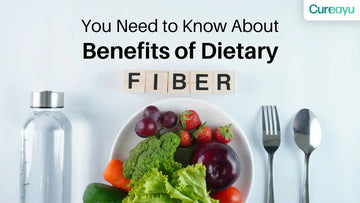In the vast world of nutritional advice and health tips, one element that consistently stands out for its myriad benefits is dietary fiber. Despite its simple name, dietary fiber plays a crucial role in maintaining a multitude of bodily functions and overall wellness. Consuming the right amount of fiber can lead to a profound improvement in various aspects of your health, ranging from digestive support to weight management.
Understanding the remarkable benefits of dietary fiber and integrating high fiber foods into your daily diet can significantly elevate your quality of life. This blog post aims to explore what dietary fiber is, why it's vital for our health, and the numerous benefits it offers. We will also dive into some high fiber foods that should be staples in your diet.
Also Read: Discovering the Bountiful Plant-Based Diet Benefits: Health, Environment, and Beyond
What Is Fiber
Dietary fiber, also known as roughage or bulk, consists of the parts of plant foods your body can't digest or absorb. Unlike fats, proteins, and carbohydrates—which your body breaks down and absorbs—fiber passes relatively intact through your stomach, small intestine, and colon and out of your body.
There are two types of dietary fiber: soluble and insoluble. Soluble fiber dissolves in water to form a gel-like material. It can help lower blood cholesterol and glucose levels. It's found in oats, peas, beans, apples, citrus fruits, carrots, barley, and psyllium. Insoluble fiber, on the other hand, promotes the movement of material through your digestive system and increases stool bulk, so it can be of benefit to those who struggle with constipation or irregular stools. Whole-wheat flour, wheat bran, nuts, beans, and vegetables, such as cauliflower, green beans, and potatoes, are good sources of insoluble fiber.
Why Is Fiber Important
Fiber is a crucial component of a balanced diet and ensuring you're consuming enough can lead to substantial health benefits. Incorporating high fiber foods into your meals helps in maintaining a healthy weight, lowers your risk of diabetes, heart disease, and some types of cancer. They aid in digestion, prevent constipation, and help in maintaining a balanced gut microbiome.
Eating the right amount of fiber from high fiber foods can also help you feel full longer, reducing overall calorie intake and aiding in weight management. Furthermore, for people with diabetes, fiber—particularly soluble fiber—can slow down the absorption of sugar and help improve blood sugar levels. Cardiovascular health also benefits from a high-fiber diet, as fiber can help lower blood cholesterol levels.
Also Read: Discover the Amazing Beetroot Juice Benefits for Your Health
Dietary Fiber Benefits
Improves Digestive Health
Fiber increases the weight and size of your stool and softens it. A bulky stool is easier to pass, decreasing your chance of constipation. In individuals with loose, watery stools, fiber may help to solidify the stool because it absorbs water and adds bulk. This promotes a healthier and more regular digestive process.
Aids in Weight Management
High fiber foods are generally more filling than low-fiber foods, so you're likely to eat less and stay satisfied longer. This can help you achieve or maintain a healthy weight. When you increase your intake of fiber, the increased bulk helps to reduce overall calorie consumption, which can also support weight loss efforts.
Lowers Cholesterol Levels
Soluble fiber found in beans, oats, flaxseed, and oat bran can help lower total blood cholesterol levels by lowering low-density lipoprotein, or "bad," cholesterol levels. Studies have also shown that high fiber foods may have other heart-health benefits, such as reducing blood pressure and inflammation.
Helps Control Blood Sugar Levels
For people with diabetes, fiber—particularly soluble fiber—can slow the absorption of sugar and help improve blood sugar levels. A healthy diet that includes insoluble fiber also may reduce the risk of developing type 2 diabetes.
Reduces Risk of Certain Cancers
Some research indicates that a high-fiber diet is linked to a lower risk of colorectal cancer. The fermentation of fiber in the large intestine has protective effects that may help reduce cancer risks. Additionally, the inclusion of fiber-rich fruits and vegetables could provide added protection by delivering antioxidants and phytochemicals.
Also Read: Discover the Top Vitamin E Fruits for a Healthy Diet
Fiber Rich Foods
Beans and Lentils: Rich in both soluble and insoluble fibers, they are excellent for supporting digestive health and maintaining stable blood sugar levels.
Berries: These are high in fiber yet low in calories, making them perfect for a healthy snack.
Whole Grains: Foods such as oatmeal, barley, and brown rice provide a good mix of both types of fiber.
Vegetables: Broccoli, Brussels sprouts, and artichokes are packed with fiber and essential nutrients.
Fruits: Apples, bananas, and oranges are very high in fiber content, aiding in both digestion and overall health.
Nuts and Seeds: Almonds, chia seeds, and flaxseeds can be easily added to various meals to increase your fiber intake.
Pears: Another fiber heavyweight, pears are delicious and versatile in various dishes.
Conclusion
Incorporating a sufficient amount of dietary fiber into your diet is crucial for overall well-being. From aiding digestion and controlling weight to reducing the risk of several chronic diseases, the benefits of dietary fiber are extensive and notable. Making a conscious effort to choose high fiber foods can dramatically impact your health in a positive way. Whether you are dealing with digestive issues, aiming to manage your weight, or looking to improve heart health, dietary fiber offers invaluable support.
By understanding the importance of dietary fiber and integrating various fiber-rich foods into your daily meals, you can take a significant step towards a healthier, more balanced life. So, take the first step today, and you'll soon notice the beneficial changes that a fiber-rich diet can offer.








